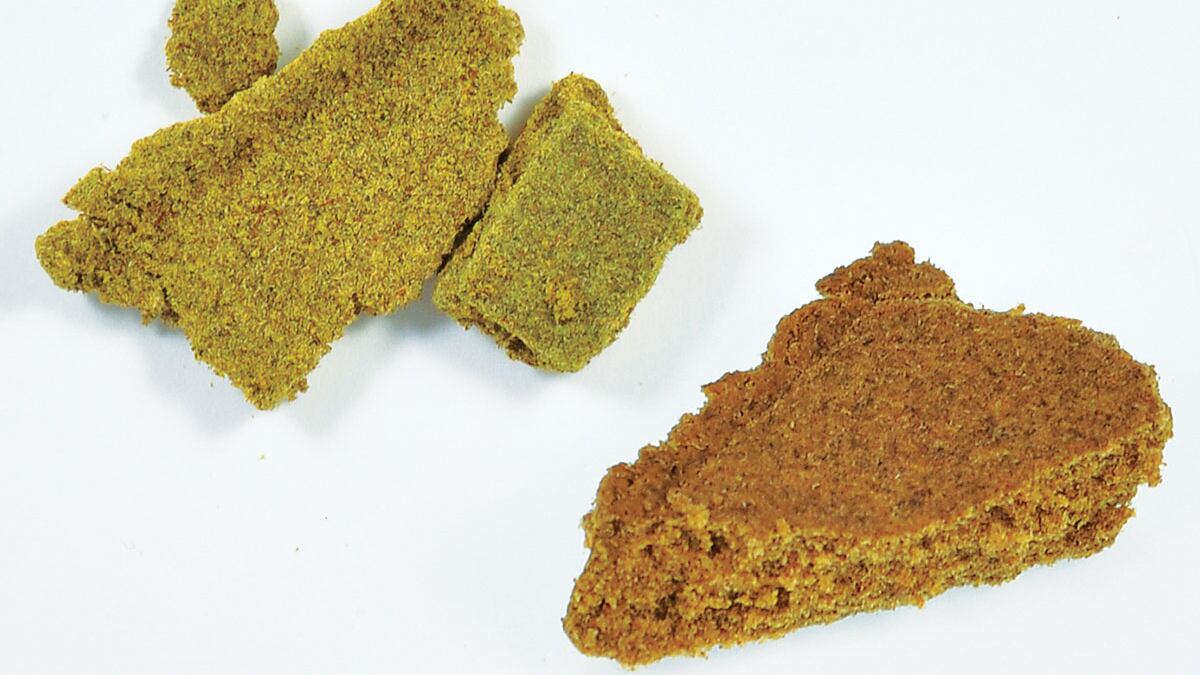A classic never dies.
Though old-school hashish has largely fallen by the wayside—due in part to the advent of modern technology that can produce cannabis concentrates and extracts boasting upward of 95 percent THC content—Moto Perpetuo Farm has been bringing a variety of hash to the Oregon market for roughly the past year.
"We did it as an homage to hash," says partner and self-described "front of the house" manager Tom Grubbs. "We are talking about 1,000 years of hash, and it has such a history, including my own relationship with it growing up."
Grubbs adds that while growing up on the East Coast, where he graduated from Hampshire College in Amherst, Mass., in 1995, whenever someone would come along with sticky, almost tarry hash that he and his friends suspected was Moroccan hash, it was seen as a delicacy and something to get excited about.
Pressed hash is different from tarry, Moroccan hash, and different still from rock-hard bubble hash that longtime Oregonian weed consumers might be familiar with. There's no need to apply heat beforehand to render it usable—a prospective smoker simply takes a piece, applies a little pressure with the fingers and watches as it crumbles into smaller, more manageable pieces that are then added to a joint prior to rolling or as a cap for a bowl of green, or smoked by itself—perhaps with a screen or inside of a vaping device.

The raw product itself is first sent to Portland Rosin Company, where the pressed hash is created using a combination of heat and pressure, which stands in stark contrast to the ice buckets and washing machines of legend that yield bubble hash. Once returned from Portland Rosin, the pressed hash sells for as much as $45 a gram, depending on the storefront—a price befitting an item that is a throwback to a bygone era of cannabis consumption.
While its price is roughly double that of hash back in the Wild West days of Oregon cannabis, can anyone really put a price on nostalgia? To top it off, Grubbs adds that all of Moto Perpetuo's products are grown organically with "biodynamic principles."
Most are familiar with organic and what that entails, but one of Grubbs' partners at Moto Perpetuo, David Hoyle, has the skinny on what biodynamic means exactly. And Hoyle knows something about growing things, considering he is known locally as one of the best suppliers of produce for restaurant chefs such as the renowned Vitaly Paley.
"The principles of biodynamic agriculture have actually been around since the 1920s. The idea came from Austrian philosopher, social activist and architect Rudolf Steiner," says Hoyle. "Essentially, biodynamic agriculture represents a philosophy where the scope of a grow is larger than that of the plants in the ground. Biodynamic agriculture truly stresses a certain symbiosis with the environment."
In short, biodynamic agriculture is a folksy approach to farming that when used in conjunction with scientific organic methods, such as eschewing chemicals in favor of natural fertilizers, grows awesome produce.
"When it comes to a product like pressed kief hash, you have something that expresses the nature of the original plant unlike many of the other concentrates or extracts," Hoyle says. "So in many ways it is a true expression of terroir, of our practices and our intent as producers."
FIND IT: Visit Moto Perpetuo Farm at motoperpetuofarm.com.

